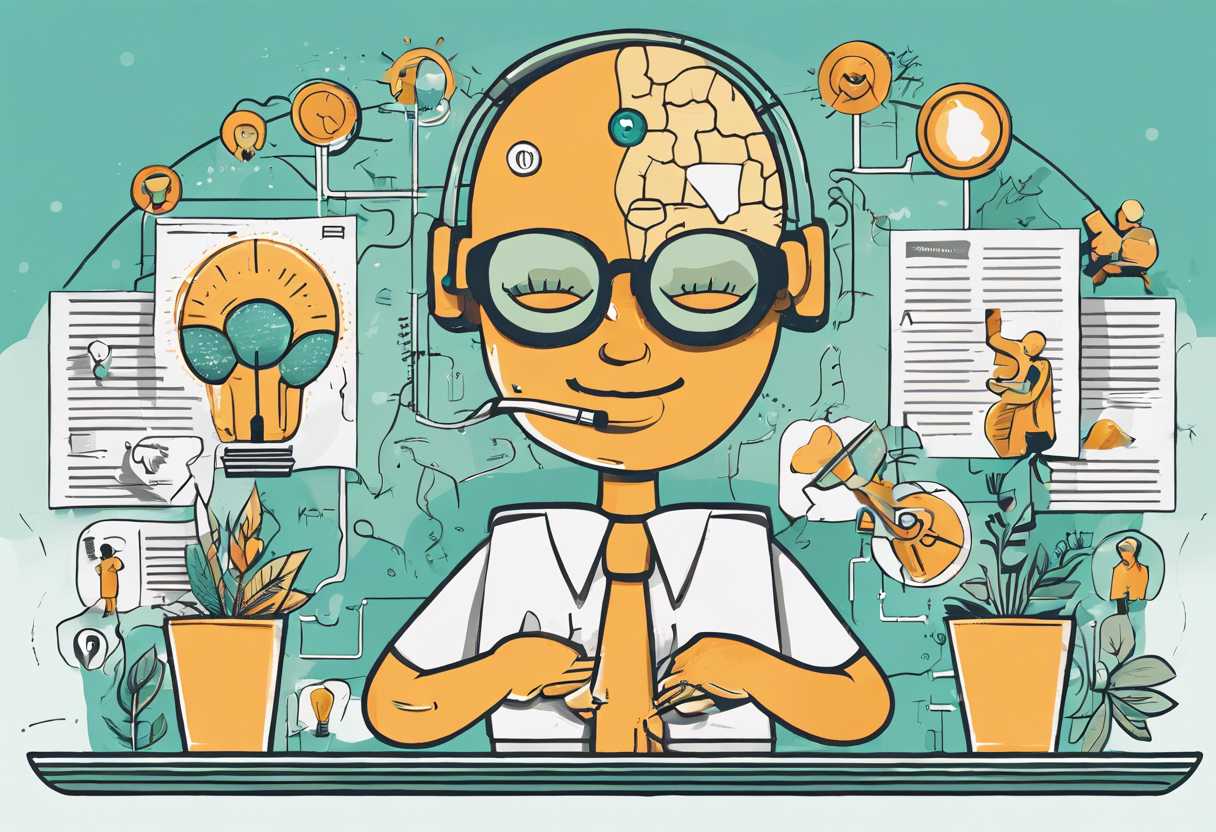In today’s competitive job market, having a strong set of soft skills is essential for professional success. But what exactly are soft skills, and why are they so important? In this blog post, we will explore some amazing soft skills that can help you stand out in the workplace and advance your career. From mastering the art of communication to the power of emotional intelligence, building strong relationships, adaptability, resilience, and the importance of time management and organization, we will delve into the key aspects of these essential skills. Whether you’re a seasoned professional or just starting out in your career, honing these soft skills can make a significant impact on your professional growth and success. So, let’s dive in and discover the amazing soft skills that can set you apart in today’s competitive workplace.
Mastering the Art of Communication: Essential Soft Skills for Success
The Importance of Effective Communication
Effective communication is a crucial soft skill that can greatly impact an individual’s success in both personal and professional settings. It involves not only the ability to convey information clearly and concisely, but also to actively listen and understand others. Mastering the art of communication can lead to improved relationships, better teamwork, and enhanced problem-solving abilities.
Developing Strong Interpersonal Skills
Interpersonal skills are an essential component of effective communication. These skills encompass the ability to build rapport, show empathy, and resolve conflicts. Developing strong interpersonal skills can lead to better collaboration, increased trust, and a more positive work environment. It is important to actively practice active listening, nonverbal communication, and emotional intelligence to enhance interpersonal skills.
Communication in the Digital Age
In today’s digital age, communication has evolved to include various online platforms and tools. It is important to adapt to these changes and master the art of digital communication to effectively convey messages and build relationships in virtual environments. This includes utilizing email etiquette, understanding the nuances of online communication, and leveraging digital tools for effective collaboration.

The Power of Emotional Intelligence: How It Impacts Your Professional Growth
Understanding Emotional Intelligence
Emotional intelligence, often referred to as EQ, is the ability to recognize, understand, and manage our own emotions, as well as the emotions of others. It plays a crucial role in our professional growth as it affects our communication, decision-making, and overall performance in the workplace. Individuals with high emotional intelligence are better equipped to handle stress, build strong relationships, and navigate complex social situations.
Impact on Leadership
Emotional intelligence is particularly important for leaders and managers. Leaders with high EQ are able to inspire and motivate their teams, resolve conflicts, and make sound decisions. They are also more empathetic and can connect with their employees on a deeper level, which fosters a positive work environment and increases employee satisfaction and productivity. Studies have shown that leaders with high emotional intelligence are more effective and successful in their roles.
Developing Emotional Intelligence
Fortunately, emotional intelligence is not a fixed trait and can be developed and improved over time. Some strategies for enhancing emotional intelligence include practicing self-awareness, actively listening to others, and seeking feedback. Additionally, mindfulness and meditation techniques can help individuals regulate their emotions and improve their overall EQ. By investing in the development of emotional intelligence, professionals can enhance their leadership abilities, improve their relationships, and ultimately advance their careers.

Building Strong Relationships: The Key Soft Skill for Effective Collaboration
The Importance of Strong Relationships in Collaboration
Effective collaboration is essential for success in any organization. It requires individuals to work together towards a common goal, leveraging each other’s strengths and expertise. However, without strong relationships, collaboration can be challenging. Building strong relationships is the key soft skill that enables individuals to communicate effectively, resolve conflicts, and work together harmoniously.
Benefits of Strong Relationships in the Workplace
Strong relationships in the workplace have numerous benefits. They create a positive work environment, foster trust and respect among team members, and improve overall productivity. When individuals have strong relationships, they are more likely to share ideas, provide constructive feedback, and support each other in achieving their goals. This ultimately leads to better outcomes for the organization as a whole.
Strategies for Building Strong Relationships
Building strong relationships requires effort and intentionality. It involves active listening, empathy, and open communication. Additionally, it’s important to show appreciation for others, be reliable, and demonstrate integrity in all interactions. By investing time and energy into building strong relationships, individuals can create a collaborative environment where everyone feels valued and supported.
Adaptability and Resilience: Why They’re Crucial Soft Skills in Today’s Workplace
The Importance of Adaptability
Adaptability is the ability to adjust to new conditions and changes in the workplace. In today’s fast-paced and ever-changing business environment, employees who can adapt quickly and effectively are highly valuable. Whether it’s learning new technologies, taking on new responsibilities, or working with different team members, adaptability is essential for success. Research has shown that companies with adaptable employees are more likely to thrive in competitive markets and navigate challenges with ease.
The Power of Resilience
Resilience is the capacity to bounce back from setbacks and overcome obstacles. In the workplace, resilience is crucial for maintaining productivity and morale, especially in times of uncertainty or adversity. Employees who demonstrate resilience are better equipped to handle stress, manage conflicts, and persevere through difficult situations. Studies have found that resilient individuals are more likely to achieve their goals and contribute positively to their teams and organizations.
Developing and Nurturing These Skills
While some individuals may naturally possess adaptability and resilience, these soft skills can also be developed and nurtured through training and practice. Employers can support their employees in honing these skills by providing opportunities for learning and growth, fostering a culture of open communication and feedback, and promoting a healthy work-life balance. By investing in the development of adaptability and resilience, organizations can create a more agile and resilient workforce that is better equipped to thrive in today’s dynamic business landscape.
The Importance of Time Management and Organization in Developing Soft Skills
Enhanced Productivity
Effective time management and organization are crucial in developing soft skills, as they directly contribute to enhanced productivity. When individuals are able to prioritize tasks, set realistic goals, and manage their time efficiently, they are better equipped to handle their workload. This leads to increased productivity, as they are able to complete tasks in a timely manner without feeling overwhelmed or stressed.
Improved Communication and Collaboration
Time management and organization also play a significant role in improving communication and collaboration skills. When individuals are organized and able to manage their time effectively, they are better able to allocate time for team meetings, discussions, and collaboration with colleagues. This leads to better communication and collaboration, as they are able to actively participate in discussions and contribute to team projects without feeling rushed or unprepared.
Reduced Stress and Improved Work-Life Balance
One of the key benefits of time management and organization in developing soft skills is the reduction of stress and improvement of work-life balance. When individuals are able to manage their time effectively and stay organized, they are less likely to feel overwhelmed by their workload. This leads to reduced stress levels and a better work-life balance, as they are able to allocate time for work, personal activities, and relaxation without feeling constantly pressured.
Conclusion
Mastering the art of communication, harnessing the power of emotional intelligence, building strong relationships, being adaptable and resilient, and managing time effectively are all essential soft skills that can significantly impact your professional growth and success. These skills are not only valuable in the workplace but also in everyday life, making them crucial for personal development and career advancement.
As you continue to develop and refine these amazing soft skills, remember that it’s not just about acquiring knowledge but also about putting it into practice. Take the time to actively work on improving your communication, emotional intelligence, relationship-building, adaptability, and time management skills. Seek out opportunities to apply these skills in your professional and personal interactions, and don’t be afraid to seek feedback and guidance along the way.
By prioritizing the development of these soft skills, you’ll not only enhance your own professional growth but also contribute to a more positive and productive work environment. Embracing these amazing soft skills will set you apart as a valuable asset in today’s competitive workplace and position you for continued success in your career.
So, what are you waiting for? Start honing these amazing soft skills today and take your professional journey to the next level!

